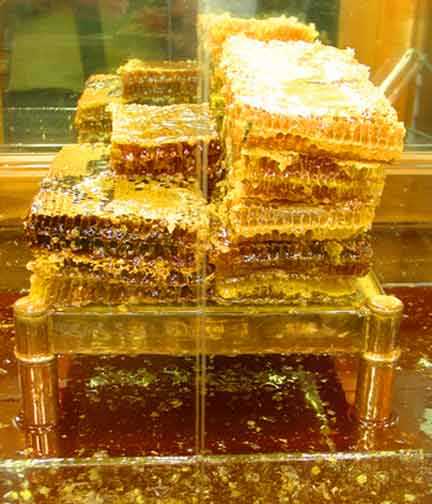
image: honey in an istanbul market, from culiblog
Why doesn’t honey need to be refrigerated?
My mentor Tom (who taught me most of what I know about teaching) loved to ask this question on biology quizzes. It’s my favorite kind of question: it forces you to apply general scientific principles to a new situation, not a far-fetched one, but a common situation you’d never thought about before. Although I could reason it out, I was embarrassed that I’d never bothered to wonder why honey has such a long shelf life. There are many small puzzles like this in daily life, that go completely unexamined.
Anyway, honey is antibacterial primarily because it’s so highly concentrated – there is significantly less water in honey (which is about 80% sugar and less than 20% water) than in a bacterial cell. To put it crudely, the honey sucks the water out of the bacteria by osmosis, and the bacteria deflate. Honey can also draw water out of humid air – supposedly, placing honey in pastries keeps them from going stale as quickly. The principle of osmosis is essential to biology, and this answer is the most important one.
But honey has other antibacterial properties as well. Its acidity impedes the growth of many microbes, it contains a variety of antioxidants, and it releases low levels of hydrogen peroxide when diluted. You can see why all of these properties would be adaptive: bees don’t want bacteria raiding their pantries any more than we do!
The exact composition and flavor of honey depend on the types of flowers the bees are allowed to harvest; some honeys, like active manuka honey, are reputed to have increased antibacterial properties and are sold as medicinal supplements. (FYI – Meadowfoam honey, while not notably medicinal, tastes mindblowingly like toasted marshmallow. Try it, it’s amazing.)
Honey was used in the ancient world as a medicine and preservative (guess what was used to embalm Dracula’s detatched head?) But for a while honey seems to have been ignored by the medical community, which is strange, because studies are now finding that honey may be just as good as many other antibacterial treatments for topical wounds like diabetic ulcers, which are notoriously persistent.
My mother has impaired circulation (non-diabetic) and her injuries take months to heal over, even with state-of-the-art burn creams and special bandaging. I’ve convinced her to try honey next time: it would be cheaper and easier to find, it would keep bandages from sticking, it would absorb the fluid that leaks from these wounds, and according to several users, it smells much better than the typical topical ointment. (Why do medicines taste and smell so awful, anyway?) The whole idea seems so obvious, I’m surprised I’ve never heard of honey as a folk remedy, the way Aloe vera is touted for sunburn: in my family we cut leaves off the plant and squeezed the gel straight onto the burn. But it turns out there’s not much scientific evidence to support this kind of use of the plant. Maybe we should have used honey?
Here’s a final question: if honey is antibacterial, why can’t you feed it to babies? It turns out honey preserves not just the heads of putative vampires, but also the spores of C. botulinum, which causes the rare but serious disease of botulism. The botulinum spores won’t proliferate in the honey, but they can’t be removed, either (sterilizing them by common methods would compromise the quality of the honey). These spores are harmless to healthy adults, but infants under one year of age can become seriously, even fatally ill. So if you try honey as a topical ointment on yourself or others, be careful not to use it where a baby could ingest it.

In grad school, part of my research required that I feed hundreds of captive Monarch butterflies. We diluted honey by about 1/2 , I think it was, and in less than a week, even refrigerated, it would start to spoil. Interestingly, the butterflies would stop feeding before we could smell the spoilage and we’d mix up a fresh batch of “nectar”.
That’s interesting! Who knew Monarchs were so picky?
It’s been forever since I did dilution series, so I hope this is in the ballpark: since honey is denser than water (~1.45 kg/L), a 50% w/w dilution of honey in water should yield a final solution that’s over 60% water by volume – a pretty big change. I think a much weaker dilution would suffice to get some microorganisms in the honey going. It would definitely be something to keep in mind – you wouldn’t want to encourage bacterial growth by diluting a topical honey dressing too much.
My understanding is that the first organisms to exploit diluted honey are wlid yeasts, so if you’d left your Monarch food to ferment, you might have eventually had butterfly wine. . . not that you or the Monarchs would probably want to drink it.
BTW, did you let the butterflies go at the end of your project, or did you have to dissect them? I’ll happily kill fruit flies any day, but I think sacrificing butterflies would be depressing.
That’s absolutely fascinating. I never thought of the honey question, either, and I’m very glad you answered it for me before I did so that I could be spared the trouble of wondering and feeling dumb.
Ah, but feeling dumb is part of the pleasure of being alive! At least, that’s what I tell myself, since I feel dumb most of the time. Please don’t disillusion me.
I am happy to know a site like this exists. I am presently doing my final year project in school. I am working on honey. I will like to know if microbes can grow on products made from honey.
Thanks.